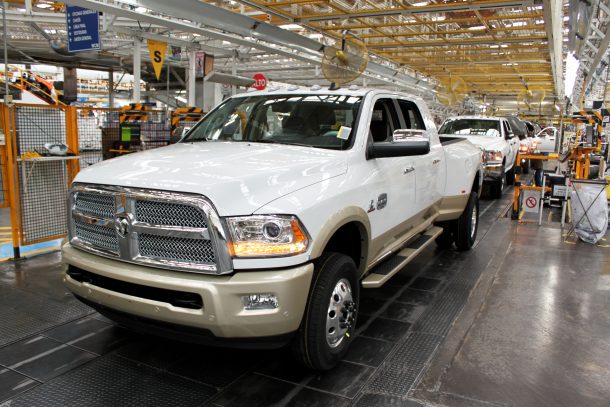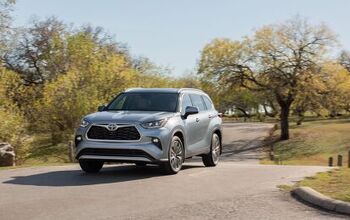Trump Promises Tariffs on All Mexican Goods Starting June 10th

Just when it seemed the trade climate in the North American region was easing, President Donald Trump launched a new salvo late Thursday, promising a 5 percent levy on all Mexican goods crossing the U.S. border if the country doesn’t stem the flow of illegal migrants.
The tariff would land on all Mexican goods on June 10th, ramping up to 10 percent on July 1 before topping out at 25 percent by October. For automakers and those who sell (and buy) the final product, the prospect of a new import levy is the stuff of nightmares.
Earlier this month, the White House removed steel and aluminum tariffs imposed on the U.S.’s northern and southern neighbors while moving forward with the USMCA trade deal. The U.S. hopes to ratify the deal this summer, with CNBC reporting that U.S. Trade Representative Robert Lighthizer has submitted a draft Statement of Administrative Action, paving the way for the deal’s Congressional consideration.
While yesterday’s tariff threat mirrors past threats from the Trump administration, this one comes with a deadline. It also came on the same day Mexican President Andres Manuel Lopez Obrador sent the renegotiated trade deal for Senate approval.
Mexican goods accounted for 13.6 percent of all goods entering the U.S. last year. The tally totalled $346.5 billion, with produce and vehicles/auto components ranking high on the list.
In a statement citing the International Emergency Economic Powers Act, the White House said:
If the illegal migration crisis is alleviated through effective actions taken by Mexico, to be determined in our sole discretion and judgment, the Tariffs will be removed. If the crisis persists, however, the Tariffs will be raised to 10 percent on July 1, 2019. Similarly, if Mexico still has not taken action to dramatically reduce or eliminate the number of illegal aliens crossing its territory into the United States, Tariffs will be increased to 15 percent on August 1, 2019, to 20 percent on September 1, 2019, and to 25 percent on October 1, 2019. Tariffs will permanently remain at the 25 percent level unless and until Mexico substantially stops the illegal inflow of aliens coming through its territory.
Domestic automakers like General Motors stand to be hit hard in such a scenario. As Automotive News reports, GM exported over 811,000 cars and light trucks from its Mexican factories last year.
“Margins are so thin in the U.S. market right now that there’s no way that any automaker is not going to pass on these tariffs to their customers,” Macquarie Securities analyst Janet Lewis told the publication.
“The unknown factor is the impact on suppliers, as components can move back and forth between Mexico, the United States and Canada up to 20 times before they make their way into assembled cars.”
As one would expect, the shares of automakers with a significant Mexican footprint fell in Friday pre-trading.
[Image: General Motors]

More by Steph Willems
Latest Car Reviews
Read moreLatest Product Reviews
Read moreRecent Comments
- Arthur Dailey The longest we have ever kept a car was 13 years for a Kia Rondo. Only ever had to perform routine 'wear and tear' maintenance. Brake jobs, tire replacements, fluids replacements (per mfg specs), battery replacement, etc. All in all it was an entirely positive ownership experience. The worst ownership experiences from oldest to newest were Ford, Chrysler and Hyundai.Neutral regarding GM, Honda, Nissan (two good, one not so good) and VW (3 good and 1 terrible). Experiences with other manufacturers were all too short to objectively comment on.
- MaintenanceCosts Two-speed transfer case and lockable differentials are essential for getting over the curb in Beverly Hills to park on the sidewalk.
- MaintenanceCosts I don't think any other OEM is dumb enough to market the system as "Full Self-Driving," and if it's presented as a competitor to SuperCruise or the like it's OK.
- Oberkanone Tesla license their skateboard platforms to other manufacturers. Great. Better yet, Tesla manufacture and sell the platforms and auto manufacturers manufacture the body and interiors. Fantastic.
- ToolGuy As of right now, Tesla is convinced that their old approach to FSD doesn't work, and that their new approach to FSD will work. I ain't saying I agree or disagree, just telling you where they are.


































Comments
Join the conversation
PUTTING THE GUADALAJARA IN GUANGZHOU-GUADALAJARA MOTORS! "GUADALAJARA MOTORS imported 811,000 vehicles from MEXICO in 2018." "General Motors stand to be hit hard in such a scenario. As Automotive News reports, GM exported over 811,000 cars and light trucks from its Mexican factories last year." Support General Motors, which supports China and Mexico! Buy American...buy a RAM, F-150, Accord or Camry!
Why (and I sincerely ask anyone who cares to, please enlighten me) do I think that, if America does manage to shut down the Mexican border, that the automakers (and producers of pretty much any consumer good that requires substantial assembly) will be looking to China? Or any other third-world nation they can spell?